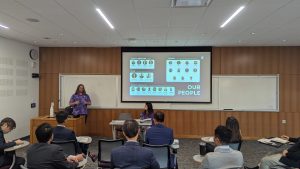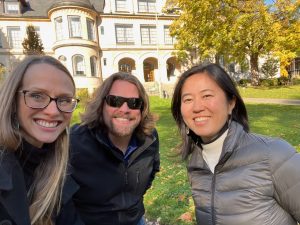The Lab spent the past year hosting international guests from Asia and Europe, inviting them to engage with community and share with other scholars.
Veronica Paternolli, Italy

Paternolli, a Computer Science Ph.D. student with a background in law from the University of Verona, visited for a month in spring. During that time she shared her work, discussed her background and explored where she sees points of intersection between the law and computer science. She engaged in many conversations about how she sees emerging technologies are changing contract law.
The timing of her visit also allowed her to participate with TPL affiliates in the Privacy Law Scholars Conference in Los Angeles.
Xinzi Lyu, China

The Lab welcomed Lyu, a Chinese graduate student, in spring 2025, and her visit will continue until late winter 2026. She is a scholar of Chinese law and technology and visiting the United States to gain a better understanding of and explore American approaches to law and technology.
Giulia Terranova, Italy

Terranova is an Italian researcher and professor at the University of Milan. She visited the Lab for two weeks, during which she presented an overview of the EU AI Act to the Lab’s Tech Policy Discussion group and participated in the World Affairs Council event.
Terranova works in Comparative Private Law and has a law degree as well as a Ph.D. in the discipline. Her main areas of research include trust law, succession law, the law of non-profit organizations, and contract law. Her book on trust law offers a comparison between the English and Italian legal systems, and she has also published on the law of non-profit organizations, comparing U.S., English and Italian legal frameworks. She recently launched a new research project focused on the regulation of artificial intelligence from a comparative perspective, with particular attention to the European and U.S. legal systems.
World Affairs Council event

In July, the Lab hosted an Association of Southeastern Asian Nations (ASEAN) Cybersecurity International Visitor Leadership Program group through the U.S. Department of State and the World Affairs Council.
The group included senior officials who work in cybersecurity from various governments as well as leaders from think tanks. The collective discussed tech policy issues, including barriers and forward-looking strategies.
The event highlighted the Lab’s work on responsible technology, and welcomed a graduate student from our sister Lab, the UW Security and Privacy Research Lab, who shared her research and then engaged on a discussion on tech policy ranging from teenage use of social media to the energy demands of technology.
Juliana Sakai, Brazil

Sakai is Executive Director of Transparencia Brasil, a nonprofit created in 2000 by a team of journalists, businesspeople and activists seeking to address government corruption and promote civic engagement as the most effective means to strengthen and hold accountable the public sector. Her group has been instrumental in national working groups on transparency, justice and artificial intelligence. On fellowship, she wants to develop strategies to strengthen and make permanent civil society’s participation in the national government’s decisions about AI.
U.K. diplomatic duo
 Robin Tyman and Mungo Woodifield from the United Kingdom met with members of the Lab to discuss tech policy on both sides of the Atlantic.
Robin Tyman and Mungo Woodifield from the United Kingdom met with members of the Lab to discuss tech policy on both sides of the Atlantic.